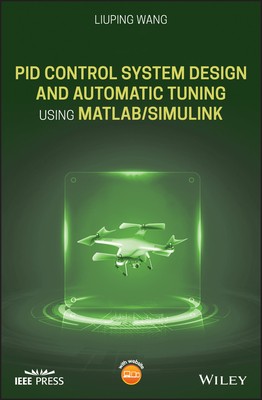
- We will send in 10–14 business days.
- Author: Liuping Wang
- Publisher: Wiley-IEEE Press
- ISBN-10: 1119469341
- ISBN-13: 9781119469346
- Format: 16.8 x 24.6 x 2.5 cm, hardcover
- Language: English
- SAVE -10% with code: EXTRA
Pid Control System Design and Automatic Tuning Using Matlab/Simulink (e-book) (used book) | bookbook.eu
Reviews
Description
Covers PID control systems from the very basics to the advanced topics
This book covers the design, implementation and automatic tuning of PID control systems with operational constraints. It provides students, researchers, and industrial practitioners with everything they need to know about PID control systems--from classical tuning rules and model-based design to constraints, automatic tuning, cascade control, and gain scheduled control.
PID Control System Design and Automatic Tuning using MATLAB/Simulink introduces PID control system structures, sensitivity analysis, PID control design, implementation with constraints, disturbance observer-based PID control, gain scheduled PID control systems, cascade PID control systems, PID control design for complex systems, automatic tuning and applications of PID control to unmanned aerial vehicles. It also presents resonant control systems relevant to many engineering applications. The implementation of PID control and resonant control highlights how to deal with operational constraints.
Provides unique coverage of PID Control of unmanned aerial vehicles (UAVs), including mathematical models of multi-rotor UAVs, control strategies of UAVs, and automatic tuning of PID controllers for UAVs
- Provides detailed descriptions of automatic tuning of PID control systems, including relay feedback control systems, frequency response estimation, Monte-Carlo simulation studies, PID controller design using frequency domain information, and MATLAB/Simulink simulation and implementation programs for automatic tuning
- Includes 15 MATLAB/Simulink tutorials, in a step-by-step manner, to illustrate the design, simulation, implementation and automatic tuning of PID control systems
- Assists lecturers, teaching assistants, students, and other readers to learn PID control with constraints and apply the control theory to various areas.
- Accompanying website includes lecture slides and MATLAB/ Simulink programs
PID Control System Design and Automatic Tuning using MATLAB/Simulink is intended for undergraduate electrical, chemical, mechanical, and aerospace engineering students, and will greatly benefit postgraduate students, researchers, and industrial personnel who work with control systems and their applications.
EXTRA 10 % discount with code: EXTRA
The promotion ends in 20d.17:04:15
The discount code is valid when purchasing from 10 €. Discounts do not stack.
- Author: Liuping Wang
- Publisher: Wiley-IEEE Press
- ISBN-10: 1119469341
- ISBN-13: 9781119469346
- Format: 16.8 x 24.6 x 2.5 cm, hardcover
- Language: English English
Covers PID control systems from the very basics to the advanced topics
This book covers the design, implementation and automatic tuning of PID control systems with operational constraints. It provides students, researchers, and industrial practitioners with everything they need to know about PID control systems--from classical tuning rules and model-based design to constraints, automatic tuning, cascade control, and gain scheduled control.
PID Control System Design and Automatic Tuning using MATLAB/Simulink introduces PID control system structures, sensitivity analysis, PID control design, implementation with constraints, disturbance observer-based PID control, gain scheduled PID control systems, cascade PID control systems, PID control design for complex systems, automatic tuning and applications of PID control to unmanned aerial vehicles. It also presents resonant control systems relevant to many engineering applications. The implementation of PID control and resonant control highlights how to deal with operational constraints.
Provides unique coverage of PID Control of unmanned aerial vehicles (UAVs), including mathematical models of multi-rotor UAVs, control strategies of UAVs, and automatic tuning of PID controllers for UAVs
- Provides detailed descriptions of automatic tuning of PID control systems, including relay feedback control systems, frequency response estimation, Monte-Carlo simulation studies, PID controller design using frequency domain information, and MATLAB/Simulink simulation and implementation programs for automatic tuning
- Includes 15 MATLAB/Simulink tutorials, in a step-by-step manner, to illustrate the design, simulation, implementation and automatic tuning of PID control systems
- Assists lecturers, teaching assistants, students, and other readers to learn PID control with constraints and apply the control theory to various areas.
- Accompanying website includes lecture slides and MATLAB/ Simulink programs
PID Control System Design and Automatic Tuning using MATLAB/Simulink is intended for undergraduate electrical, chemical, mechanical, and aerospace engineering students, and will greatly benefit postgraduate students, researchers, and industrial personnel who work with control systems and their applications.


Reviews